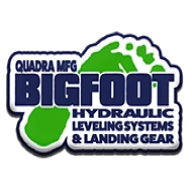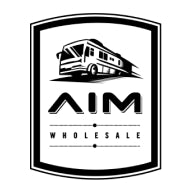Article Content
Written by the Getaway Couple Rae & Jason
You’ve scoured online forums, researched floor plans, and asked for feedback from friends. Finally, you’ve chosen the right fifth-wheel RV for your family. But don’t relax quite yet. Now you have to find the right fifth wheel hitch.
Let’s look at the different types, and you can decide which one is right for your truck bed. Let’s dive in!
What Is a Fifth-Wheel Hitch Used For?
A fifth-wheel camper requires a special hitch that a travel trailer (also called a bumper pull) doesn’t need. A travel trailer will connect to a coupler on the bumper of a tow vehicle with a hitch ball. A fifth-wheel camper will connect to the bed of a truck with a fifth-wheel hitch. Some fifth wheel hitches are used to tow horse trailers or used for other commercial purposes. But most fifth wheel hitches are used to tow fifth-wheel RVs.
Why Is It Called a Fifth-Wheel Hitch?
This hitch is designed to connect to the kingpin, which is on the RV. The large metal frame of the hitch is bolted to the bed of a truck. That allows the fifth wheel camper pin to be connected safely and towed down the road. It’s a much more secure connection since it rests in the truck's bed instead of the truck's rear. It’s like adding a “fifth wheel.”

What Are the Different Types of Fifth-Wheel Hitches?
Although these are all called fifth-wheel hitches, they’re all a bit different and used for various purposes. Most options vary in how they connect to the kingpin of the camper. Depending on what you’re looking for and your personal preferences, you may decide to install one type of hitch over another. Let’s take a look at the differences between each of these fifth wheel hitches.
2-Way Pivot Head
A 2-way pivot head only moves front to back. This is important when traveling up slopes. The truck can begin ascending without adding more strain on the hitch itself before the fifth wheel begins going uphill. They’re also designed for lighter loads.
4-Way Pivot Head
In addition to the front-to-back movement of the 2-way pivot head, a 4-way pivot head also moves side to side. If you’re boondocking or traveling on uneven surfaces often, this hitch is the better choice since it offers an extended range of movement. However, they’re more expensive than the 2-way pivot heads.
Single Jaw Hitches
Single jaw hitches have a simple one-grab connection. It has fewer parts than the pivot head hitches, increasing its strength. These are the most expensive options but also provide the smoothest ride. However, since it doesn’t pivot, you’ll have to make wider turns.

Double Jaw Hitches
A double jaw hitch has twice the power of a single jaw hitch, which means it can handle even more weight. The ride is smooth, and the connection is strong. However, like the single jaw hitch, it doesn’t pivot. You’ll need more road space when making turns.
Slide Bar Hitches
Slide bar hitches are the least expensive options. However, they aren’t as secure as the jaw hitches because there is less jaw-to-kingpin contact. They’re also much noisier. When you brake or accelerate, you’ll feel and hear the hitch rattling. But, again, it’s budget-friendly.
Gooseneck Hitches
A gooseneck hitch attaches to the camper’s ball and socket coupler. Its design is very different from a fifth-wheel hitch. There are two basic options. One is a raised ball in the truck's bed, and the other is a ball that sits directly on the truck's bed. A gooseneck hitch usually takes up less room and is easier to install.

Sliding Hitches
Sliding hitches are used most often in short bed trucks. You don’t have as large of a turning clearance when driving a short bed truck. There’s a higher chance of the fifth wheel colliding with the truck's back window. A sliding hitch moves backward by sliding towards the tailgate when a sharp turn creates more distance between the fifth wheel and truck cab. Then it returns to its regular position after the turn is complete.
What to Consider When Buying a Fifth-Wheel Hitch
After you’ve purchased your fifth-wheel camper, you need to consider the best fifth-wheel hitch for your travel needs. Price is always a factor as well as convenience. However, you should also know the weight capacity to ensure safe driving.
Price
Although your budget will affect how much you can spend on a fifth-wheel hitch, it should be the lowest consideration. The weight capacity, installation process, and ease of use should weigh more heavily in your decision-making process. If you’re towing a fifth-wheel camper, you have to make sure it’s safe. Sometimes that means spending more money. However, several good companies manufacture fifth-wheel hitches like Curt, Andersen, and B&W. So you do have options.

Weight Capacity
This may be the biggest consideration when buying a fifth-wheel hitch. Your hitch must be able to handle the amount of weight you’re putting on it. Find your camper's gross vehicle weight rating (GVWR) and then calculate about 20% of this weight. This should be the minimum hitch capacity. For example, if your fifth wheel has a GVWR of 16,000lbs, the tongue weight will be around 3,200lbs. This means the hitch you choose should be able to handle at least 3,200lbs for safe travel.
Ease of Installation
Some fifth-wheel hitches can be DIY projects, while others require professional installation. You certainly want to make sure the hitch is securely and correctly installed for safe travel. But if you want to do the work yourself, consider how difficult it will be to install. If you don’t have a background or experience in mechanics, it’s not worth doing yourself. Spend the money to have it properly installed. If something goes wrong on the open road, the results could be deadly.
Easy of Use
If you have a long bed truck, installing a fixed fifth-wheel hitch still leaves room for toting around other things when not towing a camper. However, if you have a short bed truck, you may want to consider a removable hitch. That way, you have room to use the bed of your truck for other things. You’ll also want to consider how easy it is to attach to the trailer. Kingpin fifth-wheel hitches easily slide in and out. On the other hand, gooseneck hitches require a bit more work to hitch and unhitch, but you have more bed space for storage.

There's No One Size Fits All When It Comes to Fifth-Wheel Hitches
After you’ve purchased your fifth wheel, you still have an important decision to make. But there isn’t a simple, one-size-fits-all answer. The fifth wheel hitch that works for one camper won’t necessarily work for another camper. Truck bed size, GVWR of the camper, and budget also determine the best fifth-wheel hitch for your needs. Do your research just like you did before choosing your camper. Then you’ll feel confident that what you buy is indeed the best choice for you!








